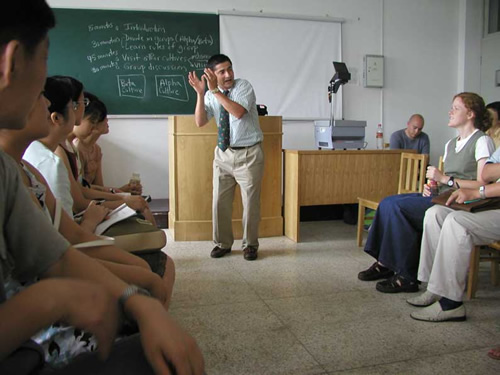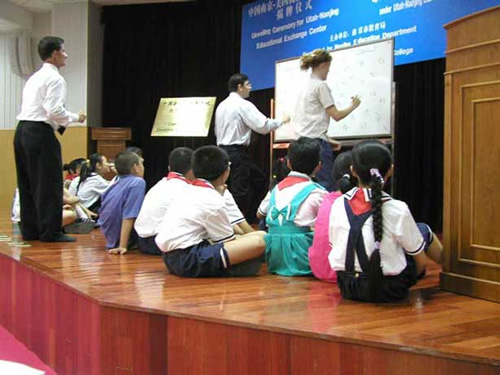Teaching English Abroad: Essential Expectations and Preparation
Key Insights for Prospective English Teachers
Realistic
expectations, a good educational background, involvement
in professional organizations, and a genuine desire
to help pave the way to the rich rewards that can
come from teaching English abroad.
Article and photos by Randall
Davis
 The
author giving a lecture on cultural diversity
to Chinese English Teachers in Nanjing, China. The
author giving a lecture on cultural diversity
to Chinese English Teachers in Nanjing, China.
|
Myths
and Realities
"Hey, you don’t
even need a degree to get a good job. Schools will accept
anyone who speaks English."
I’ve
heard this statement many times before, but before you
launch into a career in the field of TESOL (Teaching
English to Speakers of Other Languages) you should ask
yourself some important questions:
1. What are
you looking for in a career in TESOL?
First
you have to determine your options and what interests
you most. Talk to people in the field: your teachers,
former graduates, and colleagues you might meet online.
One place to explore options is an online jobs forum
like Dave's
ESL Cafe Job Discussion Forums. Teachers and students
from around the world post messages about potential
job opportunities based on their experiences.
Next
find out whether there is a market for the skills
you want to acquire in the part of the world where
you want to live. You have to be prepared to go where
the jobs are.
Keep
in mind that any job could lead you to other rewarding
experiences that you hadn’t planned for. Over
the past decade, I have been fortunate to have traveled
(because of my work in Web-based language learning
and technology) to Canada, China, Europe, Korea, Japan,
Saudi Arabia, and throughout the US. In these travels,
I have met many wonderful people and have been able
to share many things with them. Few professions give
you opportunities to be a part of other cultures to
the degree that TESOL does.
 The author teaching children. The author teaching children.
|
2. Are you
mentally prepared for teaching overseas?
Too
often, teachers who go to another country soon return
home disenchanted because things did not turn out
the way they expected. While the employer bears some
of the responsibility for preparing the new recruit,
this does not exempt the employee from gathering as
much information as possible about the host country
and the place where they will work. Study up and consider
the following:
Anyone
can teach English abroad. Until recently,
this was true. Many foreign schools and companies,
seeking to take advantage of the boom in students
interested in learning English, tended to hire
anyone who could speak English or had any post-secondary
education. However, since the profession has come
into its own and more qualified teachers are available
finding a good job with no qualification is no
longer a sure thing.
Go
with a purpose in mind. Teachers who have
clear professional goals and can sustain themselves
by nurturing their professionalism through outside
activities and (and don’t blame the foreign
culture for personal misfortunes) have the best
chance of a successful teaching experience.
Learn
to expect the unexpected. I have found
that no matter how well I planned things out, there
were always a few surprises. For example, I have
sometimes been asked to carry out additional teaching
or administrative duties beyond the stipulations
of my contract (this could happen anywhere). Under
some situations, teachers who are willing to contribute
beyond these contractual boundaries will be well
rewarded by the company for which they are working.
Speaking
of flexibility, teachers may become perplexed because
their attempts to initiate positive change are sometimes
misinterpreted or shunned. Remember that resistance
to change is often the result of underlying cultural
factors that we are not aware of. Therefore teachers
have to approach a new teaching situation with their
eyes and ears open and be patient for their ideas
to take root.
Study
the language and culture of the host country. Although
many training programs focus on the linguistic
elements of the profession, an equally compelling
reason should lead us to focus attention on diversity
training to help teachers in the acculturation
process they will need to undergo in a foreign
land. Teachers themselves should make an earnest
attempt to learn something about cultural adjustment
and training that will lead to successful experiences
abroad. Learning the language is a key step to
adjustment, so you are able to become an active
participant in everyday life. Tapping into what
is "hot" and "what's not" with
our students shows them we are not removed spectators.
Contribute
to the local culture through volunteer, social,
and educational activities: So much could
be said about a teacher’s involvement in
the lives of the people beyond the day-to-day teaching
responsibilities at work. When we lived in Japan,
our family enjoyed serving in a local Japanese
church even though we didn’t speak the language
in the beginning. We also enrolled our children
in local Japanese public schools so they could
develop friendships with children in the area and
understand the culture in which they lived.
3. How can I better
prepare myself to teach overseas?
You can start planning
for the future even during the first year of your program.
Here is a brief list of possibilities, with references
for each:
Read
up on the profession. Understand what
kinds of opportunities are available. Make sure
you know the qualifications for specific jobs.
Here are some of the best places to begin your
homework:
Starting Your
Career in TESOL and many other resources.
Dave's
ESL Cafe Job Discussion Forums
Become
an active member of TESOL and your local affiliate. Volunteer.
Attend a conference. Give a presentation on any
teaching idea you have. Getting your face out there
is important as you prepare for your job search,
and you can do this by becoming involved in a local
TESOL society or organization. Because many conference
attendees are looking for practical ideas for the
classroom, you (or perhaps a group of TESL colleagues)
could present some teaching ideas on any of the
skills areas (e.g., how to use comic strips to
teach listening and speaking skills). In addition
to seeing your name on the conference program,
you can add this presentation to your résumé.
Find
out what jobs are available where you want to go. Talk
to people. Ask questions. Consider all possibilities.
A number of websites carry information about jobs
overseas, but try to talk personally with people
who have spent time in the field. Remember that
each person’s experience will be colored
by their own expectations, perceptions of the world,
and their working situations.
Publish
an article in a newsletter, magazine, or journal. If
you have been a student of TESL or other related
study, what are you going to do with all those
papers you wrote for your university classes? Why
not put them to work for you? Often, students don’t
see the potential usefulness of their ideas — a
teaching tip or article that educators are looking
for to spice up their classes.
A
good place to begin is to write a book review. Many
TESL-related journals and magazines encourage and
welcome submissions from students as well.
Besides
sharing your ideas with others, you can add this effort
to your résumé. Few recently-graduated
students or other prospective teachers will have done
this, so publishing can set you apart from the crowd.
Work
toward advancing your degree if TESOL is your goal. Having
a bachelor’s degree in TESL or in any other
field is usually the minimum requirement for teaching
jobs in most countries and a master’s in
TESL or a related field is needed for some jobs,
particularly in higher education. There are a variety
of options for securing an MA. Distance learning
is becoming a more common and realistic choice for many who are
working overseas, far away from schools that offer
such degrees.
Prepare
yourself for your job search. Despite
the best preparation, a poor interview can jeopardize
your chances of landing your ideal job. Editor's
note: please see The
TEFL Job Interview: The Ten Most Important Questions
to Ask for more.
A
career in a TESL-related field can be extremely satisfying.
You can have a meaningful impact on so many lives. Understanding
the profession and preparing yourself adequately for
an overseas position will go a long way to ensuring positive
experiences for you and your students. Good luck.
A section of the text above came from
an earlier article published by Randall Davis in
the TESOL EFL-Interest Newsletter.
RANDALL S. DAVIS has
taught ESL/EFL since 1987 in the U.S. and Japan and has
given teacher-training workshops on language learning and
educational technology in Canada, China, Korea, Japan, Saudi
Arabia, and the U.S. He is the developer of the listening
website, Randall’s ESL
Cyber Listening Lab, an online multimedia center for
helping learners improve their comprehension skills in English.
He also is language lab coordinator and instructor at the
English Language Institute, Univ. of Utah.
|
